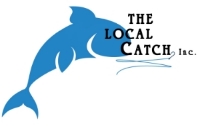Q: What is The Local Catch?
A: We’re a fisherman-run seafood processing and distribution company that specializes in marketing Rhode Island-caught seafood to Rhode Island and eastern Connecticut consumers. We sell our catch through direct sales to restaurants, farm markets, and a community-supported fishery (CSF) program.
Q: What's unique about The Local Catch?
A: Seafood sold through The Local Catch goes directly from the boat to your plate. We clean and process it at our dockside facility in the Port of Galilee, and deliver it straight to local restaurants, farmers markets, and consumers. That way, we keep our seafood at its freshest, keep seafood-related profits and jobs in the state, and keep fuel usage to a minimum.
Q: Where does The Local Catch acquire its seafood?
A: Captain Richard Cook, founder of The Local Catch and retired fisherman, buys catch from a network of local day-boat fishermen based the adjacent Port of Galilee, as well as shellfishermen who fish from docks located throughout Rhode Island.
Q: How does The Local Catch process its seafood?
A: Our processing facility, located in Point Judith, adheres to the strictest state and federal health requirements. Equipped with a refrigeration and freezer unit, an ice machine, filleting tables, and a live lobster tank, we are able to provide customized processing of locally caught seafood.
Q: Where does The Local Catch sell its seafood?
A: We market our seafood through farmers’ markets and a community-supported fishery (CSF) program. A community-supported fishery is a program modeled after the highly successful community-supported agriculture (CSA) concept that has swept the nation in recent years. Consumers who subscribe to the CSF pay an up-front fee to join; throughout the year, they receive a basket of fresh seafood every week, which they pick up from centralized pick-up locations. A CSF helps fishermen invest in boat repairs and new gear at the start of the fishing season.
Q: Where does seafood normally go once it's landed?
A: Until we formed The Local Catch, we sold our catch to centralized wholesalers, who marketed it through out-of-state seafood auctions in locations such as New Bedford, Boston, and New York. From there it was shipped out all over the country and the world. Some of it found its way back to Rhode Island, but only after passing through many hands, deteriorating in quality, and accumulating a high carbon footprint. Most Rhode Island fishermen still sell their catch this way. But now, through The Local Catch, we provide them with a better option.
Q: What's so bad about shipping seafood long-distance?
A: When seafood landed in Rhode Island leaves the state for auctioning or processing and reenters the state for sale, the product degrades, loses its freshness and flavor, and decreases in shelf life. Furthermore, fishermen get lower prices for their catch, because several sets of middlemen must take a cut between the boat and the end consumer. This makes fishermen further vulnerable in an economy where fuel prices, regulations, environmental changes, and competition from the tourism industry already pose strains to Rhode Island’s fishing communities.
Q: Why should I be concerned about the carbon footprint of a fish?
A: The carbon footprint of a product is the amount of carbon dioxide used to produce it and transport it to market. The reason we care about carbon footprint is that it represents a product’s contribution to climate change and ocean acidification. The carbon footprint of a fish fillet includes the fuel and energy that goes into: getting the boat to the fishing grounds, manufacturing the gear used to land the fish, processing the fish, and transporting the fish from the dock where it was landed to the final consumer. While we at The Local Catch cannot significantly alter the amount of fuel needed to catch and land a fish, we can reduce the amount of fuel that is spent getting the fish to market – by marketing our catch locally, instead of selling it to wholesalers who ship it to other states and countries.
